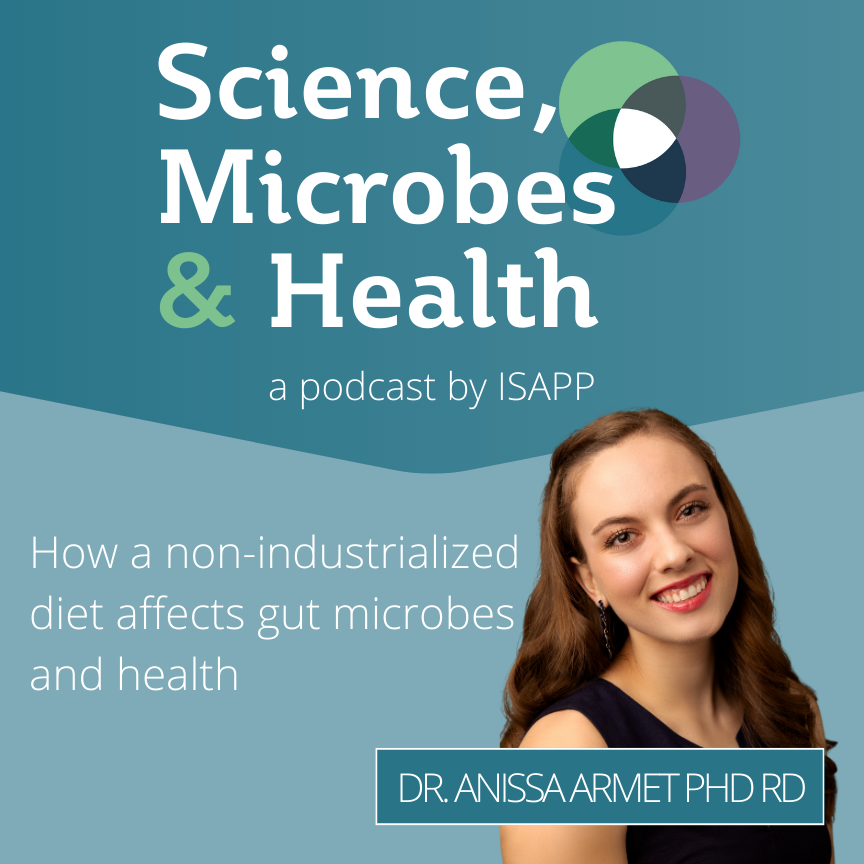How a non-industrialized diet affects gut microbes and health, with Dr. Anissa Armet PhD RD
Podcast: Play in new window | Download
Subscribe: Apple Podcasts | Spotify | RSS
This episode features Dr. Anissa Armet PhD RD from the University of Alberta in Canada, speaking about the impact of diet on both the gut microbiota and overall health. Dr. Armet, a registered dietitian and researcher, says the Western diet along with the associated gut microbiome changes have played a role (amongst other things) in the rise of autoimmune diseases in industrialized societies. Dr. Armet describes a recent dietary study she and her collaborators published, for which they created a very high fiber diet called the Non-Industrialized Microbiome restore (NiMe, pronounced “nee mee”) diet. They created recipes and meal plans based on what some non-industrialized populations in the world typically consume, which included 45 grams of dietary fiber per day, and only small portions of animal proteins and dairy products. The participants in this controlled feeding trial saw substantial cardiometabolic benefits as well as certain changes in the gut microbiota after three weeks on the diet. Interestingly, the diet initially reduced the diversity of participants’ gut microbiota, likely because of increased pH in the gut, but diversity rebounded toward the end of the trial. The researchers also introduced a strain of L. reuteri isolated from the gut microbiota of people in a non-industrialized society, to observe whether it would engraft since the diet was known to contain growth substrates for the bacteria. Although the strain did not engraft in the gut microbiota (except in one participant), the health benefits of the diet overall were still observed. The researchers concluded that the NiMe diet can be used to target the gut microbiome and change community characteristics that are relevant for health.
Episode abbreviations and links:
- Dr. Armet’s Instagram account
- Published study on the NiMe diet (called the “restore diet” in the publication): Cardiometabolic benefits of a non-industrialized-type diet are linked to gut microbiome modulation
- Previous research in Papua New Guinea, which informed the NiMe diet: The Gut Microbiota of Rural Papua New Guineans: Composition, Diversity Patterns, and Ecological Processes
- Review on how the gut microbiome informs knowledge about healthy dietary patterns: Rethinking healthy eating in light of the gut microbiome
- New publication from another research group, which complements the NiMe study findings: Immune and metabolic effects of African heritage diets versus Western diets in men: a randomized controlled trial
- Downloadable NiMe diet book: The NiMe Diet: Scientific Principles and Recipes
About Dr. Anissa Armet PhD RD:
Dr. Anissa Armet is a Registered Dietitian and postdoctoral researcher at the University of Alberta. Anissa completed her PhD in Nutrition and Metabolism in March 2024, then transitioned into her postdoc to research the effects of microbiome-targeted dietary interventions in inflammatory bowel diseases. She uses machine learning to determine if the gut microbiome predicts clinical responses in the context of precision nutrition. Anissa has authored several peer-reviewed publications, including a review on healthy eating in light of the gut microbiome and a dietary intervention trial on microbiome restoration. Being equally passionate about knowledge translation, Anissa co-authored an award-winning, open-access, high-protein cookbook designed to support muscle health, is currently developing a plant-based version, and recently co-authored an open-access ebook, The NiMe Diet: Scientific Principles and Recipes.
Sign up for our monthly newsletter
Follow us on LinkedIn, Bluesky, X, Facebook,







